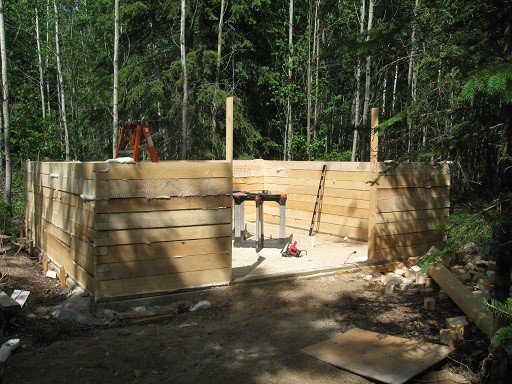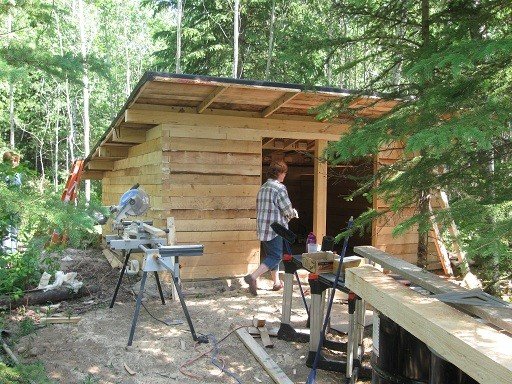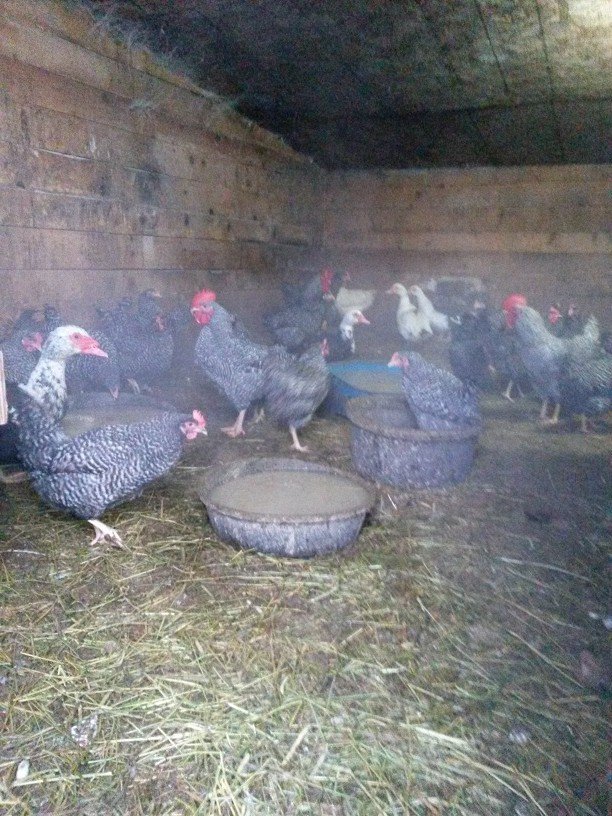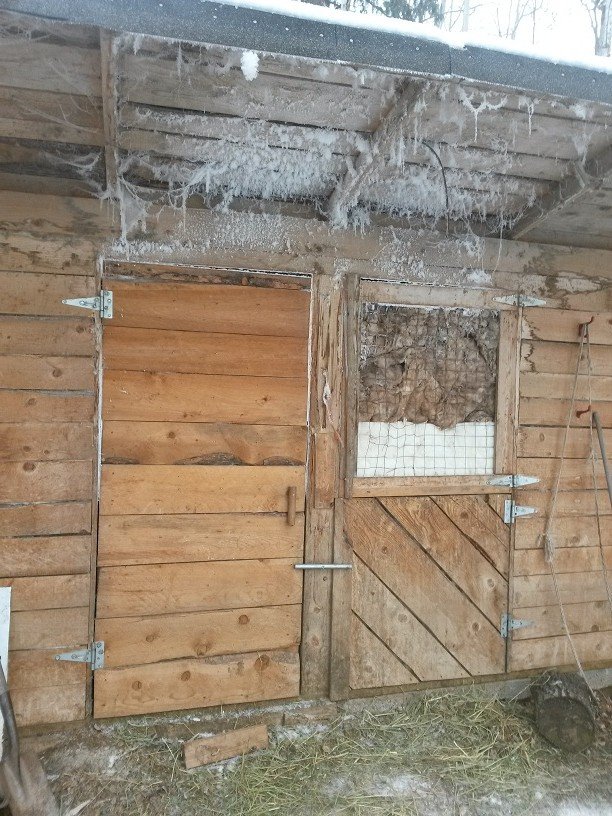Keeping off-grid laying hens at -40C/-40F
One of the biggest challenges living off grid is keeping things from freezing. Eggs are a staple for us, so how do we keep the eggs from freezing when winter temperatures can get well below -40C?
It is surprising to learn that chickens give off a lot of heat. Get enough bodies into a building and they can easily keep the temperature within the building well above freezing temperatures. Of course there is a balance as you don't want to over crowd them otherwise you stress your chickens and they then start to eat eggs, peck at each other or even resort to cannibalism. As with everything out here, finding the balance is the key!
We started by building a coop / barn that could retain the heat well for the animals. We poured a cement pad so that the building had access to the thermal mass of the earth. That helps cool them in the summer and keep them warm in winter.

15x15 coop with 4x6 timber walls. 4 feet in the back, 7 feet in the front
Then we milled 4x6 timbers using spruce trees from the land and built a cabin style structure with a low sloping roof. The back of the coop is only about 4 feet tall and the front is about 7. With the low roof there is less space to heat, making it easier for the birds to keep the space warm. The warm, moist air then flows up the ceiling to the front of the coop so that it can be vented outside. It gets very wet in the coop during winter, so we need to vent that moisture outside to help keep the chickens healthy.

We put two doors so that we can split the coop into two if necessary.
The doors can be sealed up in the winter or open during the summer. If there is a nice warm winter day, we will let them out to get some sunshine. But around here, it is cold, so most days they stay inside. We have a light in the barn to give them 16 hours of light. Anything less and egg production will diminish. Because we only get about 7 hours during the winter, it is important that we augment their light and a timer helps us do that very well.
The older chickens should be finished their molt by now, so egg production increases and we are set for a long winter of content chickens.

Barred rock chickens with Muscovy ducks. Picture is cloudy due to humidity hitting cold air when I opened the door.
Chickens don't actually need nice accommodations like this to 'survive'. They can survive in extreme cold weather. However, don't expect any eggs, expect higher feed consumption and they may freeze their combs. Not a good combination for the birds. Keeping them in a building is much more humane and you will have much happier chickens. But if it freezes in the coop, that is okay. They can handle cold temperatures. If the eggs freeze then they can be thawed to eat. That is not a big deal. Just hard to sell to your neighbour if you want to make a little cash on the side.

My doors have cracks to vent out the warm moist air. The moisture then condenses on the roof when it is really cold.
On a solar system, running a small light bulb is something that we can do. Anything more would be out of our capability. So we let the chickens do all the work and they don't mind at all. We keep about 60 - 80 birds in this coop. Any more and I think it would be too crowded. We empty the manure a few times during the winter to help remove humidity. If the coop starts to stink, we add carbon (hay/straw/leaves) and that helps keep the ammonia smells under control. Rule of thumb: If manure stinks, you don't have enough carbon! Sames goes with the humanure toilet in the house!
I am out of voting power so think the next best thing is to resteem this one. I've also posted to my FB friends and families. Happy to say we have a lot of new homesteaders just getting started. Great tips here, thank you @wwf
We have been at this for over ten years. So more than happy to share with people. If it saves them 8 years of work or even a day, then it has been worth the share! <3 Thank you for resteeming!
Crap, that was a great post. Enjoyed the amount of detail, and the explanation of why you did something. We currently honestead southern Missouri and are looking to move and start a homestead in a much colder place. This helps alot. Thank you!
You are very welcome. We are located almost 2 hours north of city commonly called Edmonton, Alberta. So it does not get much more extreme than this! lol I'm glad you enjoyed the post. Good luck on your move!
Awesome. Do you have places for your chickens to roost at night? How many hens do you have?
We have 2 small coops with runs (which helps when I need to be away from the farm). Our hens are "free range" except that I fence in my gardens or they will tear them apart. We don't sell our eggs but sometimes give them away to loved ones when we have a large surplus.
We only have 11 hens right now. No roosters until spring, since they cause more problems then hinder.
Thanks for the great post @wwf!
Yes, we have roosts and nesting boxes for them as well. In the summer they roam around all over the yard. They are away from the garden but do find their way there from time to time. We have 50 hens and 5 roosters. The roosters allow us to then hatch our own eggs. A conversation for spring. They also protect the hens and they keep an eye out for predators. They are the early warning system for the chickens. They help out a great deal.
Yeah, we have had 5 roosters in the past and there was too many fights, plus I didn't like how they treated the hens. We will try again next spring as each rooster definitely has a different personality.
Depending on the breed, you may want to limit the ratio between 8:1 or even 10:1. Any higher ratio and there is too many roosters and the hens really get beat up. Any lower and there is not enough to maintain a high fertility rate with the eggs. I work on a 10:1 ratio and they seem to do fine.
Agreed. Thanks!
Awesome post! I'm not nearly as ambitious as this but I'd love to have 6 or so chickens. One thing at a time.
Do you have to use a specific wattage etc of lightbulb? I really want to get chickens in the future, but in the UK, we don't see the sun very often lol It isn't extremely cold, but once autumn arrives, chickens stop laying as much apparently due to the lack of sunlight. Trying to get my research together before I twist my hubby's arm again to allow me to keep chickens in the garden, practicing for the real homestead life hopefully not too far around the corner! :D
Edit...I have seen a chicken charity that re-homes ex-battery hens, so I like the idea of saving some and giving them a longer chance at an egg laying free range life before the freezer :)
We have an energy efficient 40W equivalent in the barn. So no, you don't need a bunch of 100W bulbs. Just enough to give them light would suffice. We never had any issues with not enough light using a 40W. I'm toying with the idea of getting a LED grow light to see if that makes any difference. If they respond better to a more full spectrum light. But I'm not in any rush to change the light.
Brilliant, thank you! :)
Great set up! I love the beams. I am getting ready to deep clean and deep litter the coop next week!
Great post! It's interesting and cool.
An excellent book that I recommend is Storey's Guide to Raising Poultry: breeds, care, health. It is our bible and helped us out tremendously!
That book was our bible, too, when we started raising chickens, ducks, and quails.
Tropical country are the ideal place to live if you choose an off grid lifestyle.
We live in zone 2b and we make it work. May not be 'ideal' or 'easy' but living off grid here is not only possible but we can prosper as well too!
The greater the challenge, the better the reward!
One advantage of living in the tropical climate is no storage of food for winter is necessary.